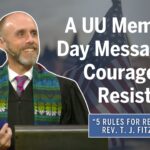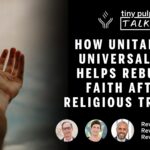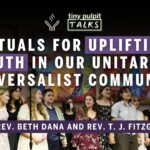An alien’s view of our world. | Faith & Film | Rev. Dr. Daniel Kanter | 06.09.24

Sermon Transcript
If an extraterrestrial alien landed on the shores of our country today, what would they find? The answer is the full catastrophe. All our human nonsense, all our conflict, all the gaps in the well-being of our communities, a human world increasingly at odds with itself. Wars waged between entities who put people between them like in Gaza. Or AI, sweeping our country, generating images and news that sometimes is not there, or drones that drop bombs controlled by computers thousands of miles away or warming oceans or technology rapidly gaining the ability to match the human mind or the indescribable need of humans to give our power away to heroes and heroines and religions.
And if those aliens arrived and they look closer, they’d also find the whole symphony of beauty, the majestic landscapes that will triumph over humanity someday, the art and music that flows through us. The joyful, unified moments of human making, the animal world that sings food made strictly for delight and so much more.
Why am I asking you this odd question today? Because this week I chose a film that I loved in 1984 to show to the film series called The Brother from Another Planet. Many of you have never seen this film. Our film was about an alien who is an escaped slave from another planet who lands in Harlem in the 1980s because he is Black and mute, everyone he meets assumes he is Haitian or Puerto, Rican or homeless or crazy, or from the borough of Queens. And everything of our world is new to him, he has to learn America and Harlem and about the lives of the people he meets while staying ahead of the slave catchers who are on his trail.
Whether you saw this film or not, imagine what an alien to this world experiences as people try to make sense of him. He sees oppressive systems inherited from our own time of slavery. He sees people trying to live through their pain. He sees art and he sees music and he sees forms of broken families and desperate nights, and he sees communities that bind together and he sees communities broken by so many other things. One of the main things he sees is loneliness. Symbolic of this are the men in the bar of the film that the film keeps coming back to. They are all friends, but they sit far apart. There’s a young girl who plays a video game and gives a speech about how she is so solo in the world. There’s a lonely policeman who’s trying to convince the alien that he is more than the uniform he wears. There are young boys who are dying from drugs in alleys. There are mothers abandoned by husbands raising children who watch TV for hours alone.
The brother from another planet receives confessions from all of these characters, from lonely people he meets because he has no words to respond. He observes them with an equanimity and is alone himself as he tries to survive on the goodwill of the few people who help him. I think the filmmaker was trying to tell us something about the danger of being separated from each other. Loneliness isn’t living alone. It is a state of mind that separates us from one another, a way that we see ourselves or define ourselves as invisible because it’s comfortable or isolated because it requires less of us.
Now, the statistics in America around loneliness are on the rise. I researched that 60%, of adults in the US feel lonely. That the loneliest age group is between 18 and 22, that social isolation is as harmful as smoking 15 cigarettes a day. That loneliness can increase premature death up to 50%, and that’s just the start of a list of 49 reasons why loneliness is a problem for us. Maya Angelou identified this in her poem in 1975, the one that T. J. read. She gives us this reflection on what it means to be human out here in the big wide world. She says nobody can make it in the world alone.
In her poem, there are notes of biblical allusions like the John 4:14 comment that “Everyone who drinks of this water shall thirst again, but whoever drinks of the water I give them,” Jesus says, “will never thirst again.” We’re not a Jesus-y church, but it’s a good quote. And the reason I say it because the poet uses it and says that there’s a way in which we have to find a home for the soul in a lonely world that this finding a home is a spiritual act, that we are nourished by the thing that she’s combating in the poem, that to be spiritually wholesome, she will need the company of others. The speaker in the poem has something to say about the state of society and suffering of the human race, alone says the poet, that all humans need is companionship and a strong community to live in a painful world that isolation wouldn’t lead us to success. How to find my soul a home she asked. Nobody can make it out here alone.
We see lots of people in the film this week who are alone. I don’t know about you, but I feel alone a lot of the time, even though I’m surrounded by my family and friends and this community in part because it’s an existential issue that we are really walking this life alone in the world. But it’s also an issue that I can create, that I can enhance, that I can place in my self-understanding by keeping myself from sharing who I am with others by closing off or shutting off the world that swirls around me, easier to do when the world is more painful.
Alone, though we cannot survive, the poet says, and yet we have perpetuated this idea that helps this isolation, which is this stiff upper lip culture. This, I don’t need anyone’s help culture. This, my success is mine alone culture. This, if I only keep quiet and don’t reveal what I really believe or who I really am, I can get by culture. That’s a culture that creates isolation more than anything. There’s something about America that any alien would see on touchdown, and that is beyond our loneliness, that we perpetuate this self-sufficiency over community and it starts with a need to protect ourselves.
Heather King in her writing today that T. J. read also says that we protect ourselves from ourselves. We hold up identities that isolate us from others. She has that beautiful line in that reading that says to be more human is a perilous undertaking, to be more human. And she’s suggesting that giving up something or some identity or something we are holding onto that props up our self-importance, our self-defining limitations, to do that is a spiritual gift that we can give ourselves. That losing something oftentimes means gaining something bigger. The Bible says this very clearly in that famous saying, whoever finds his life will lose it, and whoever loses his life for my sake will find it.
I know we are not a Jesus-y church and I’m quoting Jesus a lot. But for our purposes, the My sake isn’t Jesus. It’s that higher cause of humanity, some call God. It’s that higher call to compassion and kindness to building community out of our loneliness, out of our aloneness, out of our egos. How much do you have to lose to gain this mission in your life? I would ask you. I believe that’s a life pursuit. That’s not something that just happens this week. It might look like making efforts to deepen our care for one another, dropping some pretense to be truly humble, to be truly who we are, to find solidarity with others, to break open our loneliness and truly join in community. All of that is hard spiritual work for sure.
There’s a biblical story. I know I’m using the Bible a lot today. It doesn’t matter. There’s this biblical story I love. It’s my favorite story in the Christian scriptures. It’s about a man named Zacchaeus. Anybody know who Zacchaeus was? He’s a what?
Little man, right? Yeah. Oh, you were there. Oh, you know the Bible. All right. Zacchaeus is small in stature and he’s a tax collector and he’s a wealthy man and in order to see Jesus walking through, I don’t know, maybe there was some kind of thing going on, he climbs up in a tree, so he see Jesus. And the story says that Jesus says, Zacchaeus, come down from that tree. Let’s go have lunch. I don’t think it says that in the Bible, but I like to think he said that.
And then Jesus goes into the house with Zacchaeus and the poor people, they say, look at him. He’s always going and talking with the sinner. Once again, Jesus is taking away the one few privileges of being poor, which is being mad at rich people. But Jesus goes in there with Zacchaeus and what they talk about, we don’t know, but at the end, Zacchaeus comes out and he makes a statement at his front door. He says, I’m giving half of all I have to the poor, and if I have ever defrauded anyone, I will restore it 400%.
Jesus then comments and says, salvation has come to this house. I say, he shook the man loose from his money and greed. That Zacchaeus found his life, that his redemption was in rejoining his community. Zacchaeus is returned to his community. Jesus shows him away to lose his life so he can gain it. I’m not saying that you need Jesus to do this. I’m saying we all have to help each other do this, but Zacchaeus becomes humbled. He comes out of his tree, another symbol of his separation from others. And he understands that his wealth and well-being aren’t separated from the wealth and well-being of others, more than anything they are giving him a false sense of importance which further separates him from his community. The story asks, how does your loneliness keep you from what you really need?
I had a member of my church in Boston before I came here many years ago that comes to mind when I tell you these things. He was an architect. He was a big office, successful architect. He carried himself like a big office, important architect, no one could touch him kind of person. Until he realized how lonely he was, how isolated, how unsure of himself. Despite his success and what the world was telling him about how important he was. He realized something that he needed to do. He didn’t give away all his money. He quit his job. He became a woodworker. He decided to be in community to get more involved in the church, to spend more time serving others. He took a shift at the food pantry and he took time to bring blankets to homeless people in the Boston Common in the winter. He decided he had more to gain by losing the things that kept him propped up in order to live more faithfully to what really was important.
He needed to lose those identities, to come out of his tree and be part of something for some good that wasn’t about him. You hear what I’m saying? I think all of us can do some part of. I’m not saying quit your jobs. I’m not saying you aren’t serving. But we probably all have some ego to deflate. I know I do. We probably all have some patterns that keep us from one another, some loneliness that we cultivate around who we are because it’s safe in there. That if we’re honest, it hurts more than coming out into the open.
The poet says there are some millionaires with money they can’t use, their wives run around like banshees, their children sing the blues, they’ve got expensive doctors to cure their hearts of stone. But nobody, no nobody, can make it out here alone. You might think what I’m talking about is just being part of this community more, which is part of what I’m saying. But the next step is to be in solidarity with people, to really be known and to know. To really spend time in your life with others. To really come out of whatever closet you’re in. To really open your life to whoever you can open to, be part of their lives.
There’s a story at the end of Jeff Sharlet’s book. Jeff was here in March, his book The Undertow, about a riot and Peekskill that is about solidarity. It’s a story about Lee Hays. Those of you who grew up in the ’50s, remember Lee saying, stop rambling, stop gambling, stop staying out late at night. Go home to your wife and family. Stay there by your fireside bright. I’d like to tell my teenage sons to do a little more of that. Lee Hays was a gay man who believed in socialism and lived in Mississippi in the ’40s. How high up do you think he was in that tree protecting himself? He went missing for 10 years after planning a Black Boy Scout troop in Mississippi and organizing mixed race unions in Arkansas for sharecroppers and teaching communist plays in southern churches.
He called himself a socialist, but he said he didn’t know what kind. America called him a Weaver singing bass for the band, The Weavers. They sang Lead Belly songs. Woody Guthrie and Lee Hays formed the band and sang songs of socialism and peace and the end of racism in the ’40s and ’50s. Lee and Woody one time organized a concert in 1949 in the Hudson River valley town of Peekskill, New York. The headliner was Paul Robeson, the Black Communist. The concert was in a meadow at the end of a dirt road, the entrance was a bottleneck to the meadow. And when they started, a crowd of boys came to the gate and started jeering passersby. Nothing will happen, they said to one another. Then men by the dozens gathered, hundreds of veterans and others, Robeson and Lee Hays and Woody Guthrie and others linked arms and sang, freedom is our struggle. We shall not be moved. And rocks were thrown, and some people got hit in the head and there was blood coming from the hateful knob and the conflict escalated.
Hold the line, they sang, hold the Line, and they wrote a song later, hold the line as we held the line at Peekskill, we will hold it everywhere. They held by being pushed back and back to the stage. Killed the commie, the crowd yelled. A flaming wooden cross was flared. They escaped from the concert area and they rescheduled for a week later and they returned with hundreds of supporters to hold the line and a militia formed against them the second time, the state police joined in with the mob. People made piles of rocks all up and down the road that they would have to travel. And they held the concert. And as the cars drove out, windows were smashed and cars were flipped over and Lee and Woody got in their bus and Lee started singing, I will sing out danger. I will sing out warning, I will sing out love between the brothers and the sisters all over this land.
And the sign at the edge of Peekskill New York said, “Peekskill a friendly town.” And someone the next day added hastily, “Wake up America, Peekskill did.” Being proud of getting rid of the communists and the socialists, and you thought the problems today were bad. Lee thought, if this is America, it’s not mine. And he kept singing that song, remembering Peekskill and the solidarity they formed and the songs they sang, and he sang that famous song, Goodnight Irene, a warning song. It says, sometimes I live in town, sometimes I take a great notion to jump in the river and drown. Irene, good night, I’ll see you in my dreams. The only answer that Lee had was to be who you are and to stand together in solidarity in a painful world that no one survives any of this alone. And it takes more than just community existing, takes effort to come together to resist the things that are trying to tear communities apart.
Jeff put this at the end of his book, a book about America and the madness that’s happening today. The Christianity that’s trying to turn religion into some Trumpian violent gun rattled form of Christianity, about people who are trying to turn the country back into something it never was, about militia culture that is preparing for a civil war, about people like our governor who pardoned a man who shot a Black Lives Matter protester the day before the NRA showed up in our city. When I asked Jeff, who sees all this very clearly, where is there hope for us? He said, there really is only one answer and that is solidarity. When we stand together in mutual support to face what we are facing, solidarity like at the end of the movie, I’m going to give you the ending, all the enslaved slaves escaped, find the brother and destroy the slave catchers. That’s solidarity.
And it starts with people like Zacchaeus or the architect come out of their tree and live in faith communities and help the poor. It starts with musicians who refuse to give in to racism or threats. It starts with us who will not stop addressing things like pardons of NRA, pandering governors. Solidarity is the thing that comes when we fight our loneliness and requires our egos to recede. So friends, maybe this sermon isn’t about loneliness. I don’t know. Maybe it’s about an encouragement to lose your life, so you gain it in whatever way you can. Maybe it’s an encouragement to come out of a tree that keeps you from others or to find ways to solidarity, to stand up to a world that scares you. Or maybe it’s just to go see an old film that I liked or to read a poem or remember it when you need it. A poem that says to you in your heart and your soul, all alone, nobody, but nobody, can make it out here alone. Be well friends. Amen.







